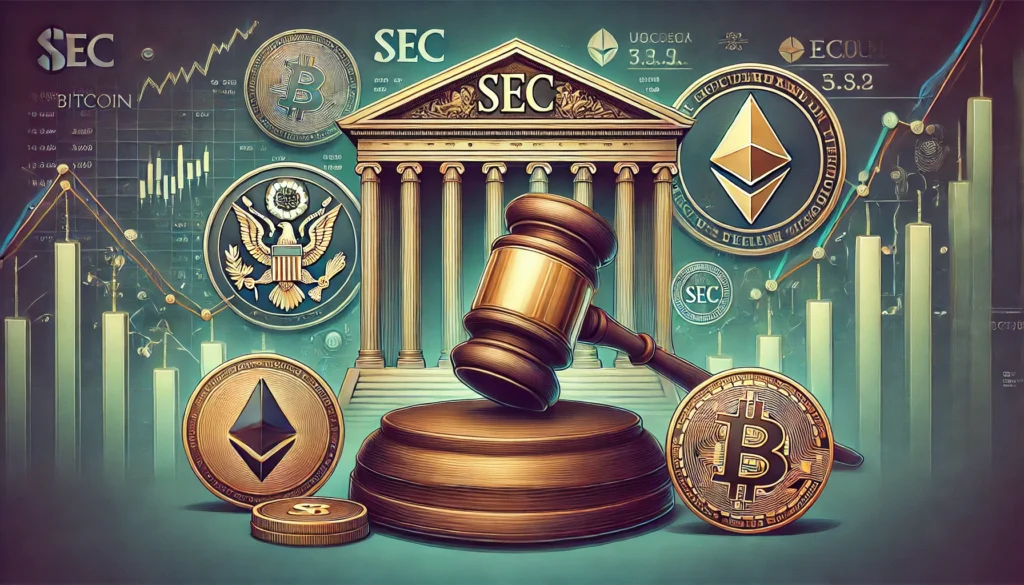
Introduction
The U.S. Securities and Exchange Commission (SEC) plays a pivotal role in shaping the cryptocurrency market. Its decisions regarding regulation, enforcement, and classification of digital assets have far-reaching implications for investors, businesses, and the market’s overall trajectory. In this article, we delve into the SEC’s recent actions, their impact on the crypto market, and what stakeholders should expect moving forward.
The SEC’s Role in Cryptocurrency Regulation
Jurisdiction and Mandate
The SEC’s primary role is to protect investors, maintain fair markets, and facilitate capital formation. In the crypto space, its jurisdiction extends to:
- Securities Classification: Determining whether a digital asset qualifies as a security under the Howey Test.
- Enforcement Actions: Addressing fraud, unregistered securities offerings, and market manipulation.
- Regulatory Guidance: Establishing rules and frameworks for compliant crypto activities.
Key SEC Decisions Affecting Crypto
- SEC v. Ripple Labs: The SEC’s lawsuit against Ripple, alleging that XRP is an unregistered security, has set a precedent for how digital assets are classified.
- Bitcoin and Ethereum Classification: The SEC’s acknowledgment that Bitcoin and Ethereum are not securities has bolstered their adoption but left other tokens in regulatory limbo.
- Spot Bitcoin ETFs: The SEC’s reluctance to approve spot Bitcoin ETFs has stymied broader institutional investment.
Recent SEC Actions and Their Market Impact
1. Increased Enforcement
In 2023 and 2024, the SEC intensified enforcement actions, targeting:
- Unregistered Token Offerings: Projects failing to register tokens as securities.
- Decentralized Finance (DeFi): Crackdowns on platforms offering lending and staking services.
- Celebrity Endorsements: Fines on celebrities promoting crypto without disclosure.
Impact:
- Reduced investor confidence in unregulated projects.
- Increased demand for regulatory clarity.
- Market volatility following enforcement announcements.
2. Clarity on Stablecoins
The SEC’s focus on stablecoins, such as Tether (USDT) and USD Coin (USDC), has included discussions on reserve transparency and classification as securities.
Impact:
- Enhanced transparency requirements for stablecoin issuers.
- Increased institutional adoption of compliant stablecoins.
3. Delays in Spot Bitcoin ETF Approvals
Despite multiple applications from major financial firms, the SEC continues to delay or reject spot Bitcoin ETF proposals, citing concerns over market manipulation.
Impact:
- Limited institutional entry into the crypto market.
- Preference for futures-based ETFs, which offer less direct exposure to Bitcoin.
Broader Implications for the Crypto Market
Regulatory Uncertainty
Ongoing SEC actions create uncertainty, particularly for altcoins and DeFi projects. This can:
- Discourage innovation within the U.S.
- Push projects to relocate to crypto-friendly jurisdictions.
Market Consolidation
Tighter regulations often favor established players over smaller, less-resourced projects, leading to:
- Increased dominance of Bitcoin and Ethereum.
- Consolidation within the crypto ecosystem.
Institutional Involvement
Clearer regulations attract institutional investors, who require compliance to mitigate risks. The SEC’s actions thus serve as both a barrier and a gateway for institutional capital.
Strategies for Navigating SEC Decisions
- Focus on Compliant Assets: Prioritize investments in cryptocurrencies with clear regulatory standing, such as Bitcoin and Ethereum.
- Monitor Regulatory Developments: Stay informed about SEC announcements and enforcement actions to anticipate market shifts.
- Diversify Investments: Spread exposure across regulated and unregulated assets to balance risk and opportunity.
- Engage Legal and Tax Experts: Ensure compliance with U.S. regulations to avoid penalties.
The Future of SEC and Crypto Regulation
Enhanced Clarity
The SEC is expected to provide more detailed guidance on:
- The classification of digital assets as securities or commodities.
- Compliance requirements for DeFi platforms and stablecoin issuers.
Global Coordination
Increased collaboration with international regulators could lead to harmonized crypto rules, benefiting cross-border projects and investors.
Potential Legislation
Congress may intervene to establish clearer regulatory boundaries, reducing the SEC’s discretionary power over the crypto industry.
Conclusion
The SEC’s decisions significantly influence the cryptocurrency market, affecting investor confidence, innovation, and global competitiveness. While its actions aim to protect investors, they also highlight the urgent need for clearer and more balanced regulations. By staying informed and adapting to the evolving landscape, stakeholders can navigate the challenges and seize opportunities in the dynamic world of digital assets.
Relevant Resources
- SEC Cryptocurrency Information: Updates on regulatory actions and guidelines.
- CoinDesk: News and analysis on crypto market trends.
- Blockchain Association: Advocacy and insights on crypto regulation.